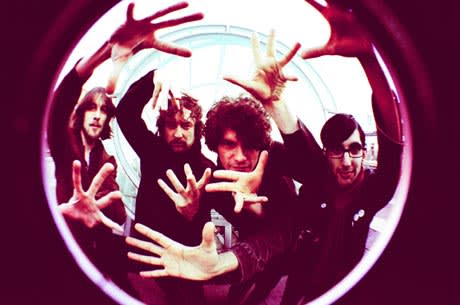In the wake of their epic pop opus, A New Devotion, Montreals the High Dials unveil a dramatic stylistic makeover, one with the potential to divide fans. The band has nixed the 60s obsessions that have dominated their discography thus far as the High Dials and their previous incarnation, the Datsons for a more modern and diverse smorgasbord of sound, including airborne shoegazer guitars ("Strandhill Sands), warped riffs reminiscent of vintage Bowie ("The Holy Ground) and rustic simplicity in waltz time ("The Drum). Like their older material, most of these songs are infused with timelessness and a distinctive pop savvy, along with retro shades of rocker ballads ("Winter Ghosts) and classic soul ("A River Haunting). However, the radio readiness of "Sick with the Old Fire and "The Lost Explorer suggests that the band is engaged in an ill-advised overture to the masses. Likewise, the discs occasionally clichéd and pedestrian turns of phrase are surprising, especially in light of its potentially dystopian title A New Devotion was a concept album set in the future, after all. Mixed by David Bianco (Teenage Fanclub, Frank Black), the albums Britpop and indie rock tones suit the band well, with a pop shimmer amplified by their new keyboardist.
This album seems to highlight a softer side of the band than weve heard in the past. Guitarist/Vocalist Trevor Anderson: Our drummer Robb [Surridge] and I were spending a lot of time demoing acoustic songs on his laptop and so a lot of them began that way, which was a pretty different approach from the previous album. Later, we started jamming other songs in more of a rocknroll way, so thats why theres two types of songs on the album.
Was it a conscious decision to phase out the 60s sound? For me, this album was a very pure expression; these songs really come from the heart. It shows a certain confidence in doing songs the way they should be done without trying to emulate our heroes as much as we used to. I guess most musicians try really hard to be like their heroes initially, and then you sort of distil the essence of exactly what it is you want to take from them and do it in your own way. Now, I feel as if Ive found a more of coherent and distinctive personal vision.
(Rainbow Quartz)This album seems to highlight a softer side of the band than weve heard in the past. Guitarist/Vocalist Trevor Anderson: Our drummer Robb [Surridge] and I were spending a lot of time demoing acoustic songs on his laptop and so a lot of them began that way, which was a pretty different approach from the previous album. Later, we started jamming other songs in more of a rocknroll way, so thats why theres two types of songs on the album.
Was it a conscious decision to phase out the 60s sound? For me, this album was a very pure expression; these songs really come from the heart. It shows a certain confidence in doing songs the way they should be done without trying to emulate our heroes as much as we used to. I guess most musicians try really hard to be like their heroes initially, and then you sort of distil the essence of exactly what it is you want to take from them and do it in your own way. Now, I feel as if Ive found a more of coherent and distinctive personal vision.
